Medical Expert Witness Invoice Template for Accurate Billing
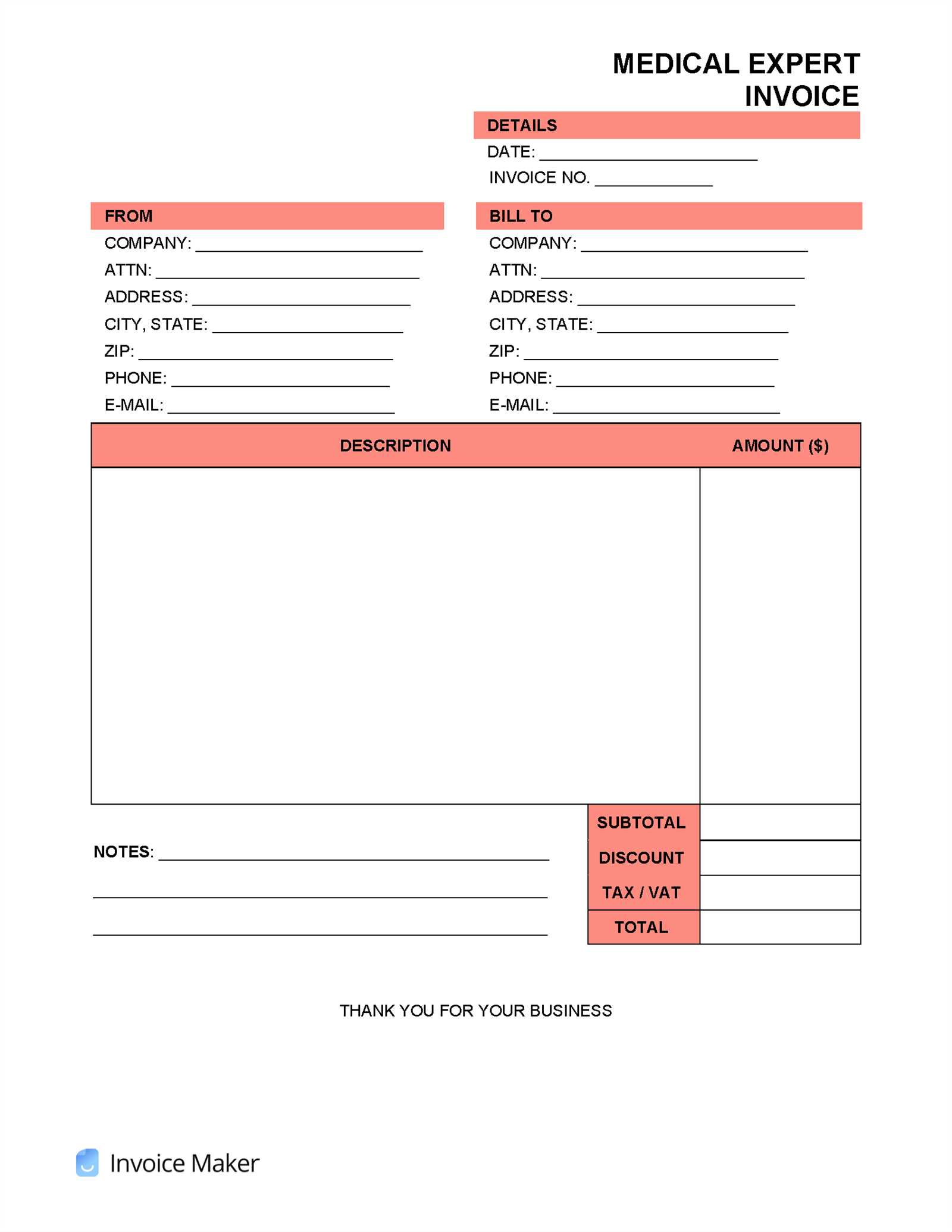
When providing specialized services in legal or healthcare settings, clear and accurate billing is essential for maintaining professionalism and ensuring timely compensation. Professionals offering expert opinions or consultations must present a comprehensive breakdown of their services to clients, whether for one-time engagements or long-term projects. A structured document is the key to avoiding misunderstandings and establishing trust between parties involved.
Creating an effective billing document helps streamline the payment process, ensuring that both parties are clear on the terms and expectations. Without a well-organized form, it becomes difficult to track payments, services rendered, or resolve any disputes that might arise. Proper documentation is more than just a formality; it serves as a record of transactions and as a reference in case of audits or disagreements.
By using a standard format, professionals can focus on delivering quality services while maintaining financial clarity. The right structure not only saves time but also improves the overall efficiency of the billing process, making it easier for both the service provider and the client to stay on track with payments and expectations.
Understanding Billing Documents for Legal and Healthcare Professionals
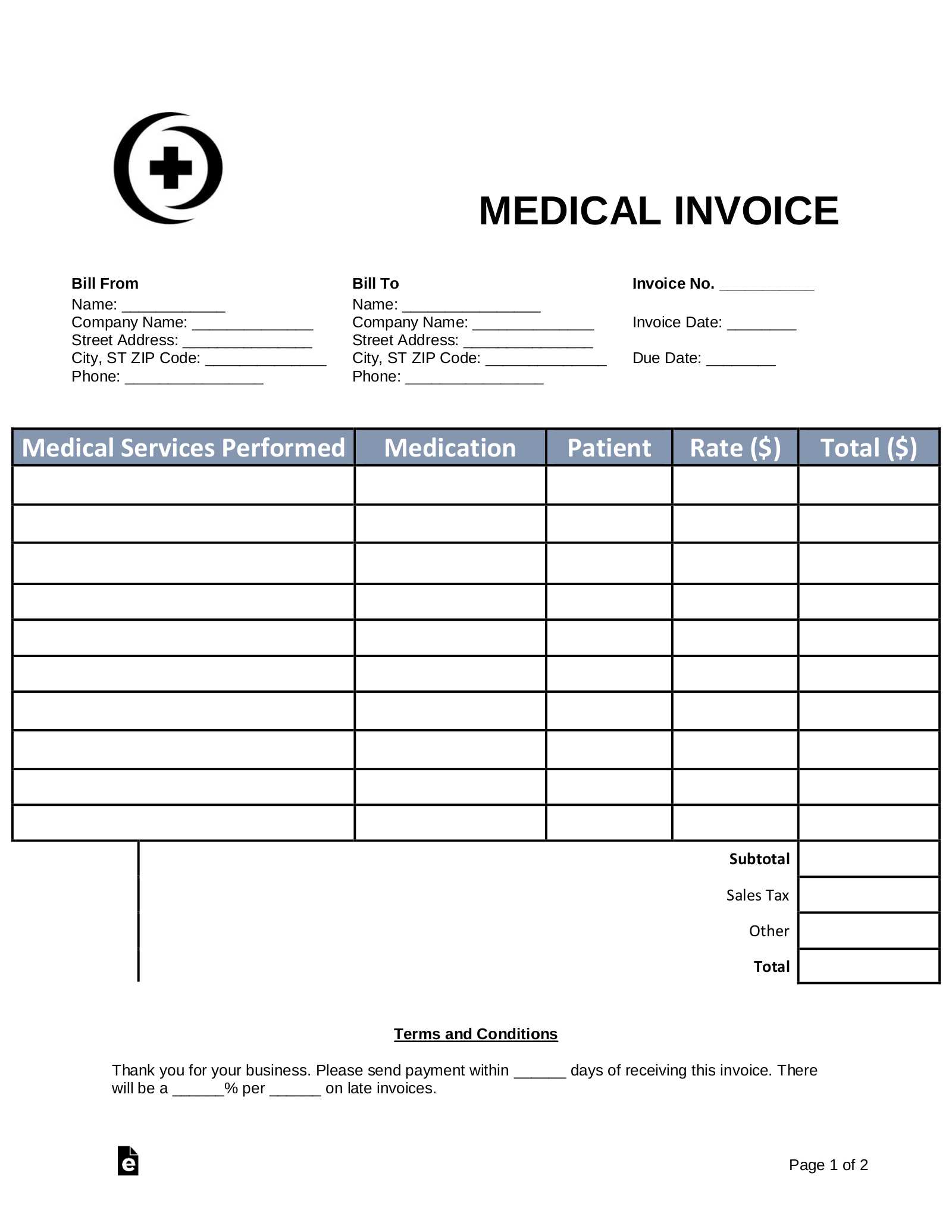
For professionals offering specialized services in the legal or healthcare fields, providing a detailed billing record is crucial. These documents ensure transparency and protect both the service provider and the client. A clear and well-structured record outlines the services rendered, rates applied, and payment terms, helping to prevent any disputes over fees and ensuring smooth financial transactions.
The Importance of Accurate Billing Records
Accurate billing is not only about tracking payments but also about maintaining trust and clarity. These documents serve as a formal agreement between the service provider and the client, detailing all aspects of the engagement. This includes the scope of work, time spent, and any additional costs that may arise. Having a precise breakdown allows for easier communication and faster resolution if questions or disagreements occur.
Key Components to Include in Your Billing Statement
Every billing record should include essential details such as the professional’s contact information, a description of the services provided, the total amount due, and payment instructions. Additionally, it’s important to specify the hourly rate or flat fees for services rendered and the dates of the work completed. Providing this information in a clear, organized manner ensures there is no confusion or miscommunication about the amount owed.
Effective billing is about more than just numbers–it establishes professionalism and clarity, reinforcing the credibility of the service provider in the eyes of the client. An accurate billing statement also serves as a reliable record for tax purposes or legal inquiries.
What is a Billing Document for Legal and Healthcare Services
A billing document for professionals providing specialized services is a formal record that outlines the terms of payment for the work performed. This document serves as a clear summary of the services rendered, helping both the service provider and the client understand the financial aspects of their agreement. It includes essential details such as the nature of the work, the time spent, and the agreed-upon fees, ensuring both parties are on the same page regarding compensation.
The primary purpose of this document is to provide a transparent breakdown of costs. It ensures that the client understands what they are being charged for and why. For the service provider, it helps maintain accurate financial records and makes it easier to track payments and resolve any disputes that may arise. This document also functions as an important reference for tax and legal purposes.
In essence, this billing document is more than just a request for payment. It serves as a professional record of the work done, contributing to the trust and credibility of the service provider. A well-structured document ensures clarity and minimizes misunderstandings, facilitating a smooth and efficient financial transaction.
Why Accurate Billing is Crucial
Accurate financial records are essential for maintaining a transparent and professional relationship between service providers and clients. When services are rendered, a precise record of the work done and the corresponding fees ensures that both parties are aligned on the terms of the agreement. Without clear and accurate billing, misunderstandings and disputes over payments can easily arise, leading to frustration and potential legal issues.
Building Trust and Professionalism
When billing is accurate, it reflects the professionalism of the service provider. A detailed and error-free financial document shows the client that their engagement is being handled seriously and responsibly. It helps establish trust by providing a clear breakdown of charges, which in turn reduces the likelihood of disputes or delays in payment. For professionals in legal and healthcare fields, maintaining a reputation for clear, reliable billing is a key factor in sustaining long-term relationships with clients.
Avoiding Payment Delays and Disputes
One of the most important reasons for ensuring precise billing is to avoid delays in payment. Ambiguous or incorrect records can lead to confusion, causing clients to question the charges or refuse to pay until discrepancies are resolved. This can significantly delay the payment process, affecting cash flow and creating unnecessary complications. A detailed and correct record minimizes these risks, making it easier to receive timely compensation for the services provided.
In summary, accurate billing is essential not only for financial clarity but also for protecting the professional reputation of the service provider. By ensuring every detail is correct, service providers reduce the risk of disputes, enhance trust, and maintain smooth financial transactions with clients.
Key Elements of a Billing Document
A well-structured financial record is crucial for clear communication between service providers and clients. It ensures both parties have a shared understanding of the work completed and the agreed-upon payment terms. For professionals in fields like law and healthcare, an effective document includes specific details that outline the scope of services, the costs, and payment expectations. By including all the necessary information, professionals can avoid confusion and ensure timely compensation.
Essential Information to Include
At the core of any billing document are a few key components that ensure transparency and clarity. These include the contact details of both the service provider and the client, a clear description of the services provided, the time spent or flat rates applied, and the total amount due. Additionally, it is important to include the date of service, payment terms (such as due date or late fees), and the preferred method of payment. This information should be organized logically to make the document easy to read and understand.
Customizing for Professional Needs
While the core details remain the same, there may be additional elements specific to the type of work performed. For example, legal professionals might need to include case numbers or specific court-related references, while healthcare providers may add diagnostic codes or medical terms. Customizing the document to reflect the unique needs of each service ensures that all relevant information is captured and that the document aligns with industry standards.
In conclusion, the key to an effective billing record is ensuring that all necessary information is clearly presented and that the document is tailored to the specific services rendered. A well-organized record builds trust, minimizes the risk of misunderstandings, and facilitates smooth transactions between professionals and clients.
Common Mistakes in Expert Witness Billing
Properly managing the financial aspects of professional services can be challenging, especially in complex legal cases. Billing for specialized consulting or analysis often involves navigating a range of requirements, and errors can lead to misunderstandings or disputes. Recognizing and addressing common mistakes in the billing process is crucial for maintaining professionalism and ensuring timely payments. Here are some of the most frequent issues encountered in the billing practices for these types of services.
Lack of Clarity in Charges
One of the most prevalent mistakes is failing to provide detailed descriptions of services rendered. Ambiguous or vague charges can create confusion and lead to delays in payments or even disputes. It’s essential to clearly outline the specific tasks performed, whether they involve research, preparation, or time spent on consultations. Providing a thorough breakdown helps avoid potential misunderstandings and ensures that the client understands exactly what they are paying for.
Inaccurate Time Tracking
Inaccurate or inconsistent timekeeping is another common error. Whether it’s rounding off hours, underestimating the time spent on specific tasks, or forgetting to log smaller activities, these oversights can lead to incorrect billing. It’s crucial to track time precisely and consistently, recording each task as it occurs to prevent discrepancies. Additionally, ensuring that the rates applied match the agreed-upon terms is essential for maintaining transparency and fairness in the financial transaction.
How to Customize Your Invoice Template
Tailoring your billing documents to reflect your unique services and brand is essential for professionalism and clarity. A customized billing format not only ensures that all necessary details are included but also helps streamline the payment process. Adjusting the layout, structure, and content can make your statements more accurate and easier for clients to understand, leading to quicker payments and fewer disputes.
Adjust the Layout to Fit Your Needs
When customizing your billing document, the first step is to adjust the layout to suit the specifics of your services. Start by including your contact information and any relevant legal details at the top. You should also clearly distinguish between different categories of charges, such as consultation time, research, or administrative work. This makes it easier for clients to see exactly what they are being charged for and helps prevent confusion.
Incorporate Payment Terms and Conditions

Including payment terms and conditions is crucial for setting expectations. Specify when payments are due, preferred methods of payment, and any penalties for late payments. Be clear about the accepted currencies, taxes, or additional fees, if applicable. This transparency fosters trust and ensures both parties are aligned on financial expectations. Additionally, incorporating a section for notes or comments allows you to provide any clarifications that may be needed for the client to understand the charges fully.
Essential Details for Medical Experts to Include
When preparing a statement for specialized consulting or analysis, it is important to ensure that all relevant information is included. A well-structured and comprehensive document not only helps clients understand the breakdown of services but also aids in smoother processing and quicker payments. Below are the key elements that should be incorporated into your billing document to ensure clarity and professionalism.
Basic Information to Include
Make sure to provide the fundamental details that identify both you and the client clearly. These include:
- Your Full Name or the name of your practice or firm
- Contact Information (address, phone number, and email)
- Client’s Information (name, address, and relevant contact details)
- Date of Service or the period during which services were provided
- Unique Identification Number (if applicable, such as a case or contract number)
Breakdown of Services and Fees
Clearly outline the services you provided and their corresponding charges. This section should be as detailed as possible to avoid any confusion or disputes. Include:
- Description of Services (e.g., consultations, report writing, research, analysis)
- Time Spent (broken down by task or service)
- Hourly Rate or Flat Fees (specify the rate applied to each service)
- Additional Expenses (e.g., travel, materials, or administrative costs)
Terms and Payment Details
To avoid any misunderstandings, clearly state the payment terms and conditions:
- Payment Due Date (e.g., 30 days from receipt)
- Accepted Payment Methods (e.g., bank transfer, check, online payment portals)
- Late Payment Penalties (if any, specify late fees or interest rates)
Billing for Consultation and Testimony Services
When offering professional advice or appearing in legal matters, accurate billing for your time and expertise is crucial. The charges should reflect not only the time spent but also the complexity and nature of the services provided. To ensure transparency and avoid any misunderstandings, it is important to clearly outline the different types of services offered and their corresponding fees. Below are some key considerations for billing consultations and testimony services.
Consultation Fees
Consultations often involve reviewing case materials, providing insights, or answering specific questions. This time should be billed according to your hourly rate or an agreed-upon flat fee. When billing for consultation, consider including the following:
- Hourly Rate for time spent on research, discussions, or case review.
- Flat Fees for structured consultations that last a set period, such as an initial meeting or detailed case analysis.
- Minimum Time Increments for short consultations, ensuring that every session is billed appropriately even for brief interactions.
Testimony Services
Billing for testimony or court appearances requires special attention due to the high demand on your time and the potential for delays. Services in this area may include preparation, travel, and actual testimony. Consider the following when determining charges:
- Preparation Time for reviewing case files, preparing statements, and rehearsing testimony.
- Travel Time and expenses, especially if court appearances require travel or extended stays.
- Hourly or Daily Rates for time spent in court or depositions.
- Cancellation or Rescheduling Fees if a scheduled testimony is changed or canceled with short notice.
By clearly outlining each aspect of the service, clients will understand exactly what they are paying for, and it will help ensure that your time and expertise are properly compensated.
How to Track Multiple Case Billings
Managing billing for several ongoing cases can be challenging, especially when each project involves different clients, timelines, and services. Keeping track of charges across multiple assignments is essential for ensuring accurate billing and timely payments. By organizing and categorizing your records, you can easily monitor the status of each case and ensure that all services are properly billed.
Organizing Billing Information
One of the most effective ways to track multiple case billings is to maintain a detailed record for each project. This allows you to monitor time spent, services rendered, and amounts owed on a case-by-case basis. A clear tracking system can help prevent overlaps and ensure no case is overlooked. Below is a simple method for tracking your billings:
| Case Number | Client Name | Service Provided | Time Spent | Amount Due | Status |
|---|---|---|---|---|---|
| 001 | John Doe | Consultation | 5 hours | $500 | Paid |
| 002 | Jane Smith | Report Preparation | 8 hours | $800 | Pending |
| 003 | Bob Johnson | Testimony | 4 hours | $400 | Pending |
This table can be expanded for each new case, allowing you to track key information like hours worked, types of services, and the payment status for each client. By maintaining such detailed records, you can more easily manage multiple billings without confusion and ensure that nothing falls through the cracks.
How to Ensure Timely Payments
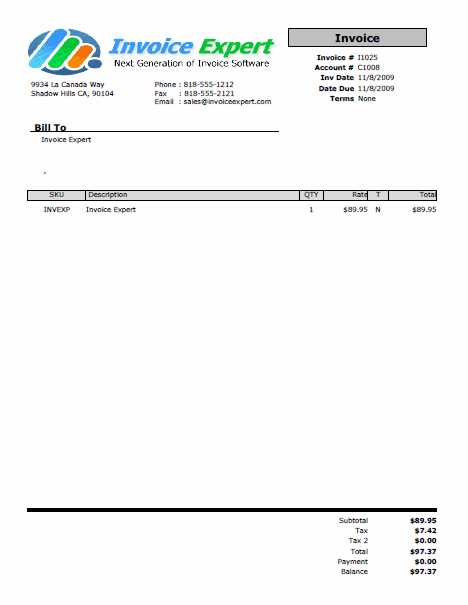
Receiving prompt compensation for your services is essential for maintaining a healthy cash flow and ensuring the sustainability of your practice. However, delays in payments can often arise, leaving you to chase clients and follow up on overdue amounts. To avoid these issues, it’s important to establish clear processes and communication from the outset. Below are strategies you can implement to help ensure timely payments for your work.
Establish Clear Payment Terms
One of the most effective ways to avoid delays in payment is to set clear expectations from the beginning. Clearly outline payment terms in your initial agreement with the client, specifying:
- Due dates for payments (e.g., 30 days from receipt)
- Accepted payment methods (e.g., bank transfer, check, credit card)
- Late fees or penalties for overdue payments
- Discounts or incentives for early payments, if applicable
Having these terms agreed upon upfront ensures both parties are on the same page and can prevent confusion down the road.
Send Timely Reminders and Follow-Ups
Even with clear payment terms, delays can still happen. To minimize this, it’s crucial to follow up with clients before and after the payment due date. Send a reminder a few days before the due date to ensure the client is aware of the approaching deadline. If the payment becomes overdue, promptly send a polite but firm follow-up. Consider implementing an automated reminder system or using accounting software to streamline this process.
By staying proactive and communicating effectively, you’ll increase the chances of receiving payments on time and avoid any unnecessary financial stress.
Handling Disputes Over Expert Fees
Disputes over fees can sometimes arise when clients feel that the charges for services provided are not justified or exceed their expectations. These disagreements can be frustrating, but it’s important to approach them with professionalism and transparency. Addressing such disputes in a clear, systematic manner can help resolve issues quickly and maintain positive working relationships. Below are some key steps you can take when handling disputes over professional fees.
Review Your Documentation
The first step in resolving any dispute is to carefully review the documentation surrounding the case, including agreements, payment terms, and any communications related to fees. This will help you clarify the situation and identify any areas where misunderstandings may have occurred. Having clear records is crucial for addressing disagreements calmly and confidently. A simple fee breakdown table can help both parties understand the charges better:
| Service | Time Spent | Rate | Total |
|---|---|---|---|
| Case Consultation | 4 hours | $150/hour | $600 |
| Report Writing | 6 hours | $150/hour | $900 |
| Travel Expenses | N/A | N/A | $150 |
Having this information readily available allows you to present an organized and accurate breakdown, making it easier to clarify any misunderstandings and resolve the dispute efficiently.
Open Communication and Negotiation
If a disagreement persists, it’s essential to engage in open communication with the client. Listen to their concerns, explain the reasoning behind your fees, and provide a detailed explanation of the services rendered. Negotiation can sometimes be a part of the process, especially if the client feels the charges are too high. Offering a small discount or alternative payment arrangements can help ease tensions and lead to a more satisfactory resolution for both parties.
By addressing disputes proactively, maintaining transparency, and communicating openly, you can prevent fee-related issues from escalating and ensure smooth resolution for future engagements.
Legal Requirements for Expert Billing
When providing specialized services in a legal context, it is essential to be aware of the legal standards and regulations that govern how professionals can charge and bill for their time. These rules not only ensure compliance with industry standards but also help to maintain transparency and avoid disputes. Understanding the legal requirements related to billing is key to ensuring that your charges are fair, justified, and properly documented. Below are some important aspects to consider when handling billing for services in the legal field.
Clear and Transparent Documentation
One of the primary legal requirements is that all charges must be clearly documented and detailed. This means providing a thorough breakdown of the services provided, including the time spent on each task, the hourly rates or fees, and any additional costs incurred. Documentation should be detailed enough to justify the charges if questioned. A professional and transparent record helps to protect you in case of disputes and ensures that the client understands exactly what they are paying for. In some cases, courts may request detailed records of the work performed, and failure to provide them can lead to complications.
Adherence to Contracts and Agreements
Before any work begins, it is crucial to have a formal agreement or contract outlining the scope of services, payment terms, and hourly rates. This agreement should specify the expected timeline, the services provided, and how the payments will be handled. Additionally, the agreement should address any potential changes in fees or scope during the course of the engagement. By having a written contract in place, you protect both yourself and your client from misunderstandings and ensure that all parties are aware of the agreed-upon terms. If a legal dispute arises over fees, the contract will serve as the key document in resolving the issue.
Compliance with Local and Federal Regulations
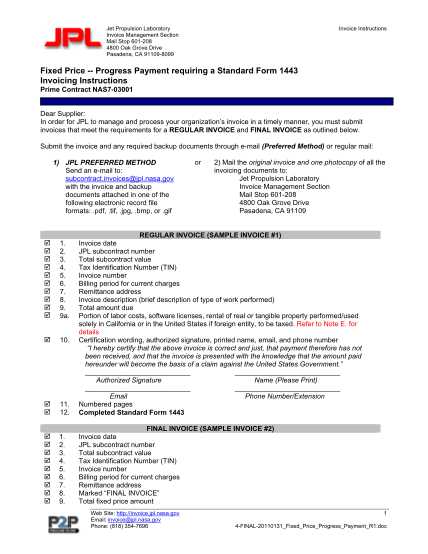
In some jurisdictions, there may be specific laws or regulations governing the fees that can be charged for professional services in legal cases. These can include maximum hourly rates, required disclosures of fees, or rules regarding conflict of interest. It is essential to research and comply with any such laws in your region or industry. Failure to follow these legal requirements could lead to penalties or legal challenges. Keeping up to date with industry guidelines and regulations is an important part of professional responsibility.
By ensuring your billing practices are clear, transparent, and compliant with legal requirements, you not only protect yourself but also establish a solid foundation for trust with your clients.
Creating Clear and Professional Invoices
When providing specialized services, delivering a well-organized and easy-to-understand billing document is essential for maintaining professionalism and ensuring timely payments. A clear, concise statement of charges not only helps your clients understand what they are paying for but also minimizes the chances of disputes. Below are key steps to follow when crafting a professional billing statement.
Key Elements to Include
To ensure that your document is both clear and professional, include the following essential information:
- Your Contact Information – Include your full name, business name (if applicable), address, phone number, and email address at the top of the document.
- Client’s Information – List the client’s full name, address, and relevant contact details.
- Unique Identification Number – Assign a unique reference number to each statement for easy tracking and future reference.
- Description of Services – Provide a detailed breakdown of services rendered, including the type of work performed and the amount of time spent.
- Payment Terms – Clearly state the payment due date, accepted methods of payment, and any late fees or penalties for overdue payments.
- Total Amount Due – Summarize the total charge, including any taxes or additional fees.
Formatting Tips for Professionalism
The format of your billing document can play a significant role in how your professionalism is perceived. Consider these tips to create a polished document:
- Keep It Simple – Use a clean, easy-to-read layout. Avoid excessive colors, fonts, or images that can clutter the document.
- Use a Logical Structure – Organize your information in sections with clear headings for easy navigation.
- Ensure Consistency – Use consistent formatting for dates, amounts, and descriptions, and align text properly to ensure readability.
- Use Clear Language – Avoid jargon or overly technical terms. Be straightforward in describing the services and fees to avoid confusion.
By including these elements and following these formatting tips, you will create clear and professional billing statements that reflect well on your services and foster positive relationships with your clients.
Using Online Tools for Invoice Creation
In today’s digital age, creating billing statements has become easier and more efficient thanks to various online tools. These platforms not only streamline the process of generating accurate and professional-looking documents but also offer features that can save time, reduce errors, and enhance organization. With a few clicks, you can create customized records, track payments, and even automate recurring charges. Below are some benefits of using online tools for your billing needs.
Online platforms provide user-friendly interfaces that allow you to quickly input the necessary details, such as services rendered, time spent, and rates. Many of these tools offer templates that are pre-designed to ensure consistency and compliance with industry standards. Additionally, most online billing software integrates with payment systems, enabling clients to pay directly through the document, which speeds up the payment process.
Another key advantage is the ability to store records securely in the cloud, making it easy to access past transactions and manage multiple clients or cases. These tools also offer automatic reminders for overdue payments, ensuring that you stay on top of outstanding balances without needing to manually follow up.
Overall, using online tools for creating and managing billing statements offers convenience, efficiency, and professionalism, helping you focus on delivering quality services while maintaining organized financial records.
Setting Your Rates as a Medical Expert
Establishing appropriate rates for your services is a crucial step in ensuring that you are fairly compensated for your time and expertise. Setting competitive yet reasonable fees requires a combination of understanding your value, researching industry standards, and considering factors such as the complexity of the task and the time commitment involved. Below are key factors to consider when determining the fees you will charge for your services.
Assess Your Experience and Qualifications
Your level of experience and the qualifications you hold play a significant role in determining your rate. Professionals with extensive experience or specialized knowledge may justify charging higher fees than those with less experience. When setting your rates, consider:
- Years of experience in your field and how that impacts the quality and efficiency of your work.
- Specialized training or certifications that set you apart from others in your industry.
- Reputation in your field, which can allow you to command higher fees due to your track record of success.
Research Industry Standards
It is important to stay informed about the current rates charged by others in your field. Researching industry standards for similar services in your area will give you a benchmark to guide your decision. This will also help you ensure that your fees are competitive while still reflecting the value of your services. Some factors to consider include:
- Regional variation – Rates may differ depending on the location or the market demand in specific areas.
- Type of services – Different services, such as consultation, report preparation, or courtroom testimony, may warrant different fee structures.
- Client’s ability to pay – You may need to adjust your rates based on the financial capacity of your clients, particularly in high-demand cases or corporate clients.
Consider Your Time and Expenses
Your rates should also reflect the amount of time and resources you invest in each case. When calculating your fees, factor in:
- Time spent on preparation, research, and the delivery of your services, including any follow-up work.
- Administrative expenses such as office supplies, travel costs, or software needed to complete your tasks.
- Market demand – If there is a high demand for your skills, you may be able to increase your rates accordingly.
By carefully considering these factors, you can set a fair and competitive fee structure that reflects your expertise while ensuring that you are adequately compensated for your work.
Managing Payment Methods for Expert Services
Handling payments efficiently is essential for any professional offering specialized services. Offering multiple payment methods can increase the likelihood of timely compensation and accommodate different client preferences. Whether through traditional methods or digital platforms, it’s important to establish a system that is secure, organized, and easy to manage. Below are key aspects to consider when managing payment methods for your services.
Payment Options to Consider
Offering a range of payment options can provide convenience for clients while ensuring that you receive payment promptly. Common methods include:
- Bank Transfers – Direct deposits to your business account offer a secure and traceable method of payment.
- Credit and Debit Cards – Many online payment processors allow you to accept card payments easily, which can speed up transactions.
- Checks – While becoming less common, checks are still used in some industries and can be an option for clients who prefer them.
- Online Payment Platforms – Services like PayPal, Venmo, or Stripe are popular choices for clients who prefer digital payments.
- Cash – Though less secure and harder to track, cash payments are still accepted in some instances, especially for smaller amounts.
Tracking Payments and Managing Records
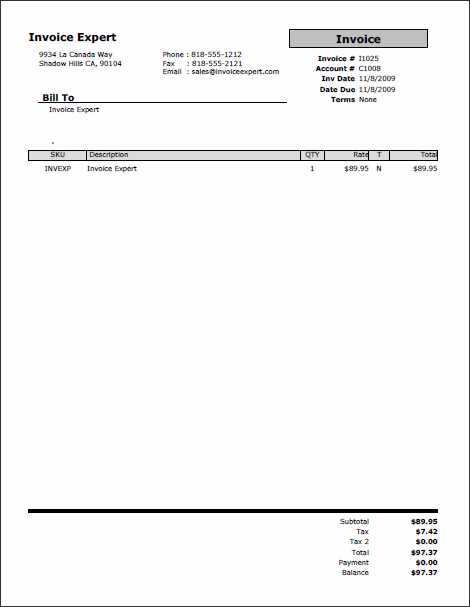
Keeping accurate records of all transactions is essential for managing finances and ensuring that payments are received on time. Below is an example of how you can organize your payment records:
| Client Name | Service Provided | Amount Due | Payment Method | Payment Date | Status |
|---|---|---|---|---|---|
| John Doe | Consultation | $500 | Bank Transfer | 10/05/2024 | Paid |
| Jane Smith | Report Preparation | $700 | PayPal | 10/07/2024 | Pending |
By tracking payment methods and keeping detailed records, you ensure that all transactions are documented and easily accessible. This make
Tips for Efficient Invoicing and Record-Keeping
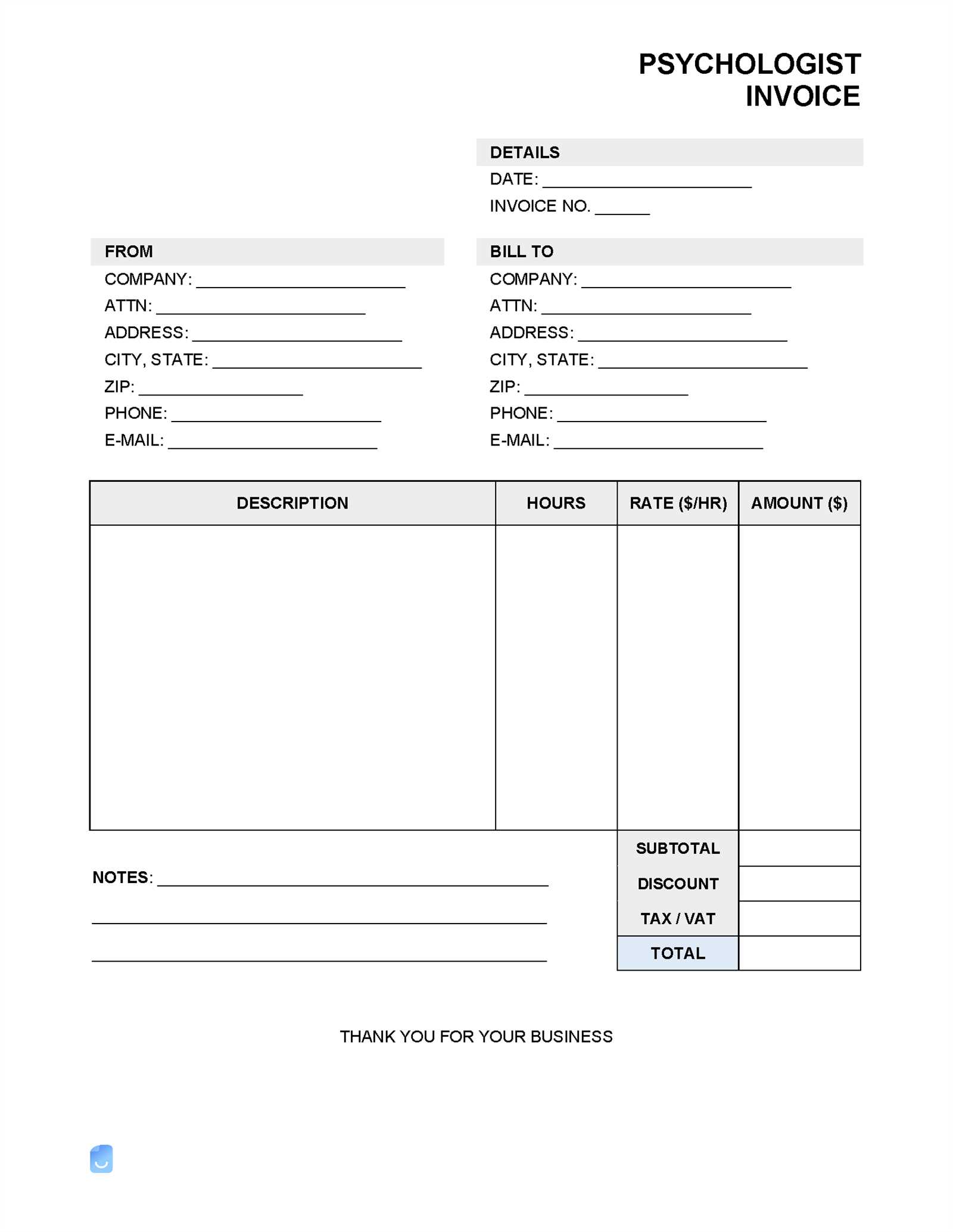
Maintaining clear records and efficiently managing payment requests is key to running a successful practice. Whether you are handling one project or multiple assignments, a streamlined approach to billing and documentation ensures that you stay organized and reduce the risk of errors or missed payments. Below are a few practical tips for improving the efficiency of your billing process and keeping accurate records.
Use Consistent and Clear Documentation
It is essential to maintain consistency in your records. Each statement should contain the same level of detail and be formatted in a way that is easy to understand. Key details such as the nature of services, time spent, rates, and total amounts should always be clearly listed. Inconsistent documentation can lead to confusion and disputes. To stay organized:
- Standardize Your Format – Use a consistent layout for each statement, with the same headings, font size, and style.
- Detailed Breakdown – Break down the charges for each service separately, such as time spent on research, consultation, or preparation, along with applicable rates.
- Track Payment Status – Clearly note whether payment has been received or is still pending to avoid any follow-up issues.
Utilize Digital Tools for Automation
With advancements in technology, digital tools now offer automated solutions to make the billing and record-keeping process smoother. Using accounting software or online platforms can save you time and reduce human error. Some benefits of using these tools include:
- Automatic Reminders – Set up reminders for overdue payments to ensure you don’t have to manually follow up with clients.
- Cloud Storage – Store your records securely online, allowing easy access and reducing the risk of losing important documents.
- Instant Tracking – Many platforms allow you to track payments in real-time, so you know when a client has paid or if there are delays.
By applying these simple practices and leveraging digital solutions, you can keep your financial records in order, ensure timely payments, and focus more on your work rather than the administrative side of your business.